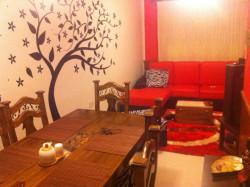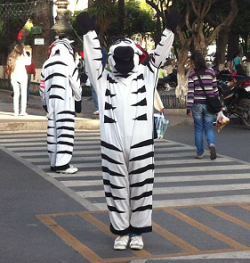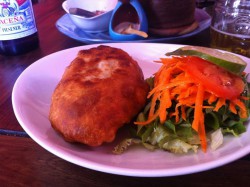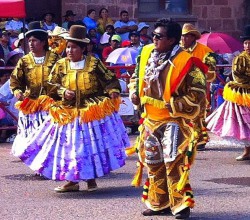- Home » Expat Articles » Interviews » Australian Expat Living in Bolivia - Interview with Brigid and Dan
Australian Expat Living in Bolivia - Interview with Brigid and Dan
| Published: | 2 Jun at 9 AM |
Want to get involved?
Become a Featured Expat and take our interview.
Become a Local Expert and contribute articles.
Get in touch today!
Become a Local Expert and contribute articles.
Get in touch today!
Filed: Interviews,Bolivia
Sucre Life is brought to you by husband and wife team, Brigid and Dan. They’ve been travelling through Central and South America since the start of 2013. Desperately in need of a rest and somewhere awesome to spend Christmas, they found Sucre and made themselves at home. Brigid and Dan's expat blog is called Sucre Life, Bolivia (see listing here)
Where are you originally from?
Brig is from Australia and Dan lived in Scotland until the age of 22 when he decided to move to the land down under. There he found the girl of his dreams (or at least some better weather) and decided to make Australia his home for the next 10 years.
In which country and city are you living now?
We're actually writing this interview from Salta, Argentina. For the next 7 months we'll be traveling through Argentina, Chile and Patagonia living the nomadic lifestyle. It was hard to leave behind our life in Sucre, but there's just so much of the world to see!
How long have you lived in Bolivia and how long are you planning to stay?
For the past 5 months we made our home in Sucre. It was sad to say goodbye as we had such a wonderful time living there, but we definitely plan to return to Sucre in the near future.
Why did you move to Bolivia and what do you do?
Sucre is Bolivia's, and possibly South America's, most beautiful city. We were only planning to stay for a week or so, to recharge the batteries after almost a year of travel, but we quickly fell in love with the tranquil yet happening vibe of the city. Sucre is definitely one of those places that draws you in and unravels itself slowly.
During our time in Sucre we studied Spanish, volunteered and worked on our website. Dan is a security consultant / web developer so is responsible for the content on Sucre Life and keeping WordPress happy. Brigid (a former music teacher) now works in marketing so is in charge of providing our social media followers the latest and greatest news from Sucre.
Did you bring family with you?
Nope, just ourselves and everything we could fit into our 30L backpacks! Many of the Bolivians we met during our time in Sucre were quite keen on us having children, so you never know, we might have a wee one with us on our next visit!
How did you find the transition to living in a foreign country?
By the time we arrived in Sucre we had encountered an array of different cultures and living circumstances. That being said, the transition into Sucre life definitely took patience. Bolivia is, after all, a developing country and things are a bit slower, dis-organised and chaotic than we're used to back home. Our favorite saying (coined by a lovely British couple we met in Sucre) for when things didn't quite occur as expected was to shrug the shoulders and say "TIB (This is Bolivia) my friend, TIB"!
Our biggest challenge was hands down the language barrier. Very few people speak English in Bolivia, so in the beginning we were limited in our conversations with people. That being said, the lack of English spoken enabled us to progress rapidly with our Spanish. Also, people in Sucre are very friendly and helpful, which made life that bit easier.
Was it easy making friends and meeting people; do you mainly socialise with other expats?
There aren't a huge amount of expats living in Sucre yet. Most of our friends were other travelers who we met either through our Spanish school, nights out on the town, or people we'd met on previous travel adventures. Brigid met people through her volunteering and we were also very lucky to strike up a lovely relationship with the Bolivian family who rented us our apartment.
What are the best things to do in the area; anything to recommend to future expats?
Sucre is best explored on foot, and we really enjoyed soaking up the city little by little. Eating tucumanas and drinking quinoa beer at Condor Cafe was a favourite past-time of ours. One of the highlights of our stay was treking to the Maragua Crater where we got to see dinosaur footprints up close and stay with a Bolivian family in the countryside. Salsa dancing on Friday nights was always fun and we enjoyed going to see a movie in English every now and then at the local cinema.
What do you enjoy most about living in Bolivia?
We both really loved the fact that the city doesn't impose anything on you. Sucre is very safe and tranquil, but there's always something to see, do and experience, if that's what you're searching for. The relaxed nature of the people and the pleasing aesthetics of the city was also a positive for us. We were pleasantly surprised by the range of dining options available, from the cheap and traditional to the more upscale and international. Also, for the fellow vegetarians out there, Sucre offers a number of great places to enjoy a meat-free meal.
How does the cost of living in Bolivia compare to home?
Wow, it just doesn't compare! Coming from Australia, we couldn't believe how far our money went in Sucre. Often, eating out was just as cheap as cooking a meal at home. Our 3 story house (including rooftop terrace, bar, cable tv, fast wifi, and central location) cost us $400 a month. And this was definitely one of the more expensive options. You can find living arrangements for much, much cheaper. Spanish lessons are the cheapest you'll find in South America, and the teachers are of excellent quality.
What negatives, if any, are there to living in Bolivia?
Unfortunately the internet in Sucre isn't the fastest or the most reliable. The trick is to be picky with your provider and not just settle for the cheapest option. That being said, we were able to skype family back in Oz and the UK, and had no trouble working online. Just don't expect to download a movie in-time for dinner!
Fortunately, according to recent news bulletins, Bolivia has secured satellite service to improve internet access across the country hopefully as soon as 2015.
If you could pick one piece of advice to anyone moving to Bolivia, what would it be?
Take some Spanish lessons. You don't need to be fluent, but having a grasp of the basics will make the transition that much easier.
What has been the hardest aspect to your expat experience so far?
Extending our visas was a little tricky. The folks at the immigration office were extremely helpful, but like everything in Bolivia, it took its sweet time to get forms signed and for correct information to be passed on. Always give yourself plenty of leeway regarding timelines when dealing with anything administrative in Bolivia.
When you finally return home, how do you think you'll cope with repatriation?
We've both lived abroad before so not too concerned about repatriation. Being able to flush the toilet paper and drink water out of the tap will be a very welcome change :)
What are your top 5 expat tips for anyone following in your footsteps?
After spending time as tourists in Sucre we noticed that there were numerous fascinating sights, free events and cool places to go out, however none of the info was available online. The best places to go didn't show up on Tripadvisor – you needed a local to point them out.
Our time was spent exploring and enjoying the city, writing about what we found. Sucre is a city best enjoyed with a full view of what’s going on. We’re here to give you that view.
How can you be contacted for further advice to future expats coming to your area?
Feel free to contact us through our website www.sucrelife.com or follow us on Facebook www.facebook.com/sucrelife
Here's the interview with Brigid and Dan...
Where are you originally from?
Brig is from Australia and Dan lived in Scotland until the age of 22 when he decided to move to the land down under. There he found the girl of his dreams (or at least some better weather) and decided to make Australia his home for the next 10 years.
In which country and city are you living now?
We're actually writing this interview from Salta, Argentina. For the next 7 months we'll be traveling through Argentina, Chile and Patagonia living the nomadic lifestyle. It was hard to leave behind our life in Sucre, but there's just so much of the world to see!
How long have you lived in Bolivia and how long are you planning to stay?
For the past 5 months we made our home in Sucre. It was sad to say goodbye as we had such a wonderful time living there, but we definitely plan to return to Sucre in the near future.
Why did you move to Bolivia and what do you do?
Sucre is Bolivia's, and possibly South America's, most beautiful city. We were only planning to stay for a week or so, to recharge the batteries after almost a year of travel, but we quickly fell in love with the tranquil yet happening vibe of the city. Sucre is definitely one of those places that draws you in and unravels itself slowly.
During our time in Sucre we studied Spanish, volunteered and worked on our website. Dan is a security consultant / web developer so is responsible for the content on Sucre Life and keeping WordPress happy. Brigid (a former music teacher) now works in marketing so is in charge of providing our social media followers the latest and greatest news from Sucre.
Did you bring family with you?
Nope, just ourselves and everything we could fit into our 30L backpacks! Many of the Bolivians we met during our time in Sucre were quite keen on us having children, so you never know, we might have a wee one with us on our next visit!
How did you find the transition to living in a foreign country?
By the time we arrived in Sucre we had encountered an array of different cultures and living circumstances. That being said, the transition into Sucre life definitely took patience. Bolivia is, after all, a developing country and things are a bit slower, dis-organised and chaotic than we're used to back home. Our favorite saying (coined by a lovely British couple we met in Sucre) for when things didn't quite occur as expected was to shrug the shoulders and say "TIB (This is Bolivia) my friend, TIB"!
Our biggest challenge was hands down the language barrier. Very few people speak English in Bolivia, so in the beginning we were limited in our conversations with people. That being said, the lack of English spoken enabled us to progress rapidly with our Spanish. Also, people in Sucre are very friendly and helpful, which made life that bit easier.
Was it easy making friends and meeting people; do you mainly socialise with other expats?
There aren't a huge amount of expats living in Sucre yet. Most of our friends were other travelers who we met either through our Spanish school, nights out on the town, or people we'd met on previous travel adventures. Brigid met people through her volunteering and we were also very lucky to strike up a lovely relationship with the Bolivian family who rented us our apartment.
What are the best things to do in the area; anything to recommend to future expats?
Sucre is best explored on foot, and we really enjoyed soaking up the city little by little. Eating tucumanas and drinking quinoa beer at Condor Cafe was a favourite past-time of ours. One of the highlights of our stay was treking to the Maragua Crater where we got to see dinosaur footprints up close and stay with a Bolivian family in the countryside. Salsa dancing on Friday nights was always fun and we enjoyed going to see a movie in English every now and then at the local cinema.
What do you enjoy most about living in Bolivia?
We both really loved the fact that the city doesn't impose anything on you. Sucre is very safe and tranquil, but there's always something to see, do and experience, if that's what you're searching for. The relaxed nature of the people and the pleasing aesthetics of the city was also a positive for us. We were pleasantly surprised by the range of dining options available, from the cheap and traditional to the more upscale and international. Also, for the fellow vegetarians out there, Sucre offers a number of great places to enjoy a meat-free meal.
How does the cost of living in Bolivia compare to home?
Wow, it just doesn't compare! Coming from Australia, we couldn't believe how far our money went in Sucre. Often, eating out was just as cheap as cooking a meal at home. Our 3 story house (including rooftop terrace, bar, cable tv, fast wifi, and central location) cost us $400 a month. And this was definitely one of the more expensive options. You can find living arrangements for much, much cheaper. Spanish lessons are the cheapest you'll find in South America, and the teachers are of excellent quality.
What negatives, if any, are there to living in Bolivia?
Unfortunately the internet in Sucre isn't the fastest or the most reliable. The trick is to be picky with your provider and not just settle for the cheapest option. That being said, we were able to skype family back in Oz and the UK, and had no trouble working online. Just don't expect to download a movie in-time for dinner!
Fortunately, according to recent news bulletins, Bolivia has secured satellite service to improve internet access across the country hopefully as soon as 2015.
If you could pick one piece of advice to anyone moving to Bolivia, what would it be?
Take some Spanish lessons. You don't need to be fluent, but having a grasp of the basics will make the transition that much easier.
What has been the hardest aspect to your expat experience so far?
Extending our visas was a little tricky. The folks at the immigration office were extremely helpful, but like everything in Bolivia, it took its sweet time to get forms signed and for correct information to be passed on. Always give yourself plenty of leeway regarding timelines when dealing with anything administrative in Bolivia.
When you finally return home, how do you think you'll cope with repatriation?
We've both lived abroad before so not too concerned about repatriation. Being able to flush the toilet paper and drink water out of the tap will be a very welcome change :)
What are your top 5 expat tips for anyone following in your footsteps?
- When moving to a new country this is a little quote we like to keep in mind: “When you travel, remember that a foreign country is not designed to make you comfortable. It is designed to make its own people comfortable.” – Clifton Fadiman
- Do your research on visas, vaccinations and health care options before you move to a new country. You don't want to have to head home before your new adventure has even begun
- Don't be afraid to try the local cuisine, especially at the markets and street-stalls. Just remember to start off slowly. Every time you travel to a new destination, your body needs time to adjust to new bacteria so take it easy when it comes to eating until you build up some resistance
- If you're an avid reader and moving to a non-English speaking country, invest in an e-reader as you most likely won't be able to find novels written in English
- Take time to learn the culture and traditions of the place you are moving to. Respect works both ways. You will have a richer experience having taken the time to understand the way of life in your new abode
After spending time as tourists in Sucre we noticed that there were numerous fascinating sights, free events and cool places to go out, however none of the info was available online. The best places to go didn't show up on Tripadvisor – you needed a local to point them out.
Our time was spent exploring and enjoying the city, writing about what we found. Sucre is a city best enjoyed with a full view of what’s going on. We’re here to give you that view.
How can you be contacted for further advice to future expats coming to your area?
Feel free to contact us through our website www.sucrelife.com or follow us on Facebook www.facebook.com/sucrelife
Grab a featured expat badge that links to this interview!
 Copy and paste code to display the Featured Expat Badge:
Copy and paste code to display the Featured Expat Badge:Comments » No published comments just yet for this article...
Feel free to have your say on this item. Go on... be the first!





 Brigid and Dan is an Australian expat living in Bolivia. Blog description: Sucre is an amazing place to visit and live. It has numerous fascinating sights, free events, and cool places to go out. But it's also largely an offline city. Events aren't advertised on Facebook - they appear on posters outside the venue. The best places to go don't show up on Tripadvisor - you need a local to point them out.
Sucre Life is our attempt to show you some of these hidden gems. As we explore and enjoy the city, we're posting about what we find. Sucre is a city best enjoyed with a full view of what's going on. We're here to give you that view.
Brigid and Dan is an Australian expat living in Bolivia. Blog description: Sucre is an amazing place to visit and live. It has numerous fascinating sights, free events, and cool places to go out. But it's also largely an offline city. Events aren't advertised on Facebook - they appear on posters outside the venue. The best places to go don't show up on Tripadvisor - you need a local to point them out.
Sucre Life is our attempt to show you some of these hidden gems. As we explore and enjoy the city, we're posting about what we find. Sucre is a city best enjoyed with a full view of what's going on. We're here to give you that view.





